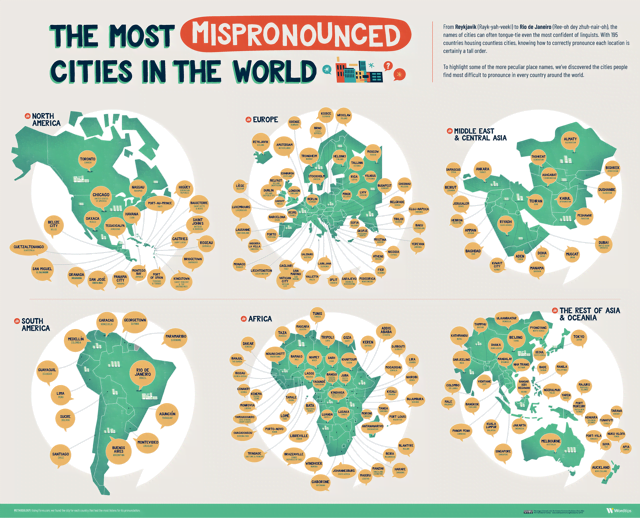When we talk, we often notice accents first. We enjoy mimicking them, and some accents can influence our buying choices. But what really is an accent, and how does someone develop it? “We all have our own accent, but it’s interesting to see the levels of awareness that people have about what qualifies as an accent or not,” says Adam Cooper, teaching professor and director of linguistics at Northeastern University.
Why do certain accents, like the Georgia drawl, fade away while others stay the same? And why do you and your parents have different accents even if you grew up in the same neighborhood or region?
Northeastern Global News had a chat with Cooper to learn all about why we speak the way we do. This interview has been shortened for conciseness and clarity.
Most people are generally able to recognize certain accents, but linguistically speaking, what is an accent?
When we discuss an accent, we’re talking about the way words are pronounced or the patterns of pronunciation linked to a specific version of a language.
It’s just one part of what we generally consider as a dialect. A dialect is a systematic variation of a language influenced by various social factors such as where someone is from, socio-linguistic factors like economic class, cultural background, and gender. These social aspects, which shape how we define ourselves and our identities, can also influence how we use language.
For any dialect, one defining characteristic is how words are actually pronounced. Take the Southern drawl, for instance, which was the focus of the study mentioned in the Washington Post. In that part of the country, words like “my” or “house” were historically pronounced with a diphthong and elongated to “hawse” and “mah.”
There are other features not related to how words are spoken, such as word choice or grammatical patterns. Southern English speakers might be more accustomed to using what we call double modals, like “might could.” For example, they might say, “I might could do that for you.” This is another aspect of their dialect, but it’s about sentence structure rather than pronunciation.
An accent is just one part of a larger dialectal pattern, which includes a variety of features operating at different levels of language structure.
How do accents develop? How can we acquire an accent or lose an accent?
One factor that influences how language works, emphasizing that language isn’t isolated, is the constant movement of people. People regularly move and interact with others from various parts of the country or the world. When we have the chance to engage with speakers from different linguistic backgrounds, it often influences how we use language, whether we’re consciously aware of it or not.
For example, if individuals from a different part of the country move to the South, they start interacting with people already there and may adopt the local language features and accent. At the same time, they might bring their own language patterns and contribute them to the mix. It’s like a melting pot of language influences.
As much as moving around can lead to changes in language, if there’s limited interaction with speakers from diverse backgrounds, it can slow down those changes.
In the past, communities near the Appalachian Mountains have been somewhat cut off from the rest of the country. When you examine the English used in that region, you notice many features that are considered more conservative. This means they maintain characteristics of English as it was spoken hundreds of years ago, which might have disappeared in other places.
Why can parents have an accent that their children don’t have (or vice versa) even if they’ve grown up in the same place?
Language change is a constant. Even in a specific geographic area, the physical space might stay the same from one generation to the next, but the people interacting with each other can be different. Those who grew up in an area decades ago, during their formative years when they were developing their own personal language system, may have interacted with a different group of people compared to the younger generations in the same area today. Over the course of decades, you can observe changes in the diversity of people moving into the area.
It’s impossible to perfectly preserve a language from one generation to the next because everyone has their own personal experiences engaging with language and the world around them, as well as with other speakers. We are all shaped by our unique circumstances.
Is there a particular accent, for any reason, that is particularly interesting to you?
One of the things that I enjoy studying is something like the Southern drawl in Southern English or what we also have in the northern cities vowel shift where instead of pronunciations like “bag,” you get “byag,” characteristic of cities like Buffalo and Chicago. What I really enjoy studying about these and what I try to impart to my students as well is that these are all systematic variations. They’re not just random departures from what we think of as “correct English,” but they can all be analyzed systematically with the same degree of rigor that we can analyze any kind of language.
What we try to impart is that, at the end of the day, there’s no right or wrong way. Everyone has an accent. We may have a sense of what a “general American accent” is, but by no means is that taken to be the right way that a language like English is used. We all have our own accent, but it’s interesting to see the levels of awareness that people have about what qualifies as an accent or not.
We all have these different dialects and accents and they’re all valid forms of expression.
Source: Northeastern Global News






